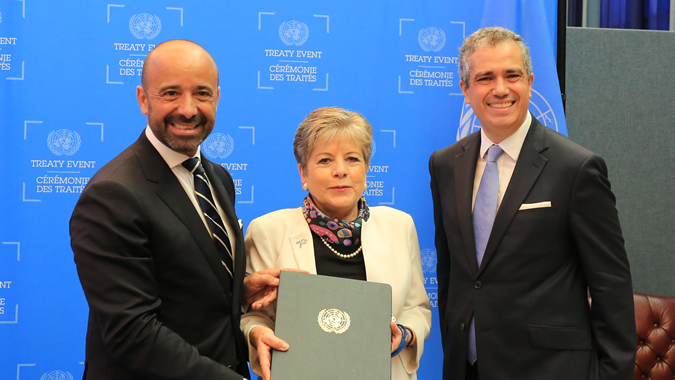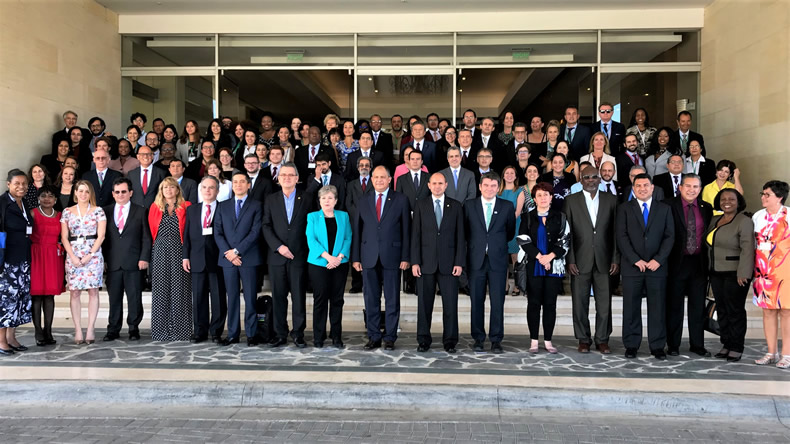ECLAC Urges All Countries in Latin America and the Caribbean to Sign and Ratify the Escazú Agreement
Work area(s)
On the first anniversary of its adoption, the organization’s Executive Secretary, Alicia Bárcena, publishes an open letter highlighting the relevance of this first environmental treaty in the region.

Today, March 4th, marks one year since the adoption of the Regional Agreement on Access to Information, Public Participation and Justice in Environmental Matters in Latin America and the Caribbean, known as the Escazú Agreement, in reference to the town in Costa Rica where, in 2018, 24 of the region’s countries concluded six years of negotiations to achieve what today constitutes the first environmental treaty in the region.
On the occasion of this anniversary, Alicia Bárcena, Executive Secretary of the Economic Commission for Latin America and the Caribbean (ECLAC) – the United Nations organization that holds the agreement’s technical secretariat – unveils an open letter in which she urges all the countries of the region to sign and ratify the accord as promptly as possible.
“Today, March 4th, is a historic day for environmental democracy in our region. Exactly one year ago, 24 countries of Latin America and the Caribbean adopted the Escazú Agreement in Costa Rica, giving the world a lesson regarding regional multilateralism for sustainable development,” Bárcena indicates at one point in the text.
“The Escazú Agreement is a tangible demonstration of our region’s commitment to more egalitarian, more just and more sustainable development,” states the senior UN official, calling on the countries that have not yet signed or ratified it to do so soon.
“Today more than ever, our region needs more and better environmental democracy and the prompt entry into force and implementation of the Escazú Agreement to benefit our countries and their societies,” Bárcena stresses.
The full text of her letter follows:
March 4, 2019
Open letter by ECLAC’s Executive Secretary, Alicia Bárcena, on the occasion of the first anniversary of the adoption of the Escazú Agreement
Ladies and Gentlemen:
Today, March 4th, is a historic day for environmental democracy in our region. Exactly one year ago, 24 countries of Latin America and the Caribbean adopted the Regional Agreement on Access to Information, Public Participation and Justice in Environmental Matters in Latin America and the Caribbean (“Escazú Agreement”) in Escazú, Costa Rica, concluding six intense years of preparations and negotiations and giving the world a lesson regarding regional multilateralism for sustainable development.
Since being opened for the signature of the 33 countries of Latin America and the Caribbean on September 27, 2018 in the framework of the annual general debate of the 73rd session of the United Nations General Assembly, the Escazú Agreement has drawn significant backing. To date, 16 countries have signed the Agreement (Antigua and Barbuda, Argentina, Bolivia, Brazil, Costa Rica, the Dominican Republic, Ecuador, Guatemala, Guyana, Haiti, Mexico, Panama, Paraguay, Peru, Saint Lucia and Uruguay) and others are in the process of doing so. I celebrate the significant step forward made by these 16 countries and all of those that will soon follow suit.
The Escazú Agreement is the first regional environmental treaty of Latin America and the Caribbean and the only one to emerge from the United Nations Conference on Sustainable Development (Río+20). In addition, it is the first in the world to establish specific provisions for the promotion, protection and defense of defenders of human rights in environmental matters. With the ultimate aim of guaranteeing for present and future generations the right to a healthy environment through access to information, public participation and justice, strengthening capacities and cooperation, and focusing on leaving no one behind, the Escazú Agreement is a tangible demonstration of our region’s commitment to more egalitarian, more just and more sustainable development. Furthermore, it contributes to the implementation of the 2030 Agenda for Sustainable Development and multilateral environmental agreements, such as the Paris Agreement.
It is important to recall that the Escazú Agreement is an agreement between States, but above all, it is a compact between each State and its society. It is a citizen’s agreement, made by and for the people of our region. It reflects our regional priorities, recognizes and develops essential democratic rights, and places equality at the center of development, seeking to incorporate all sectors of society to confront environmental challenges of such magnitude as climate change, natural disasters, desertification and biodiversity loss.
The first anniversary of the adoption of the Escazú Agreement constitutes a special reason for celebration that leads us to congratulate ourselves and acknowledge each and every person who made this innovative collective achievement possible. Today also represents an opportunity to reaffirm its relevance and invite those countries of our region that have not yet done so to sign and ratify it as promptly as possible.
The signature and ratification of the Escazú Agreement will be even more significant given the important gatherings that will take place in 2019 and that have special ties to the Agreement. From April 22 to 26, the Third Forum of the Countries of Latin America and the Caribbean on Sustainable Development will be held in Santiago, and from July 9 to 18 in New York, the Sustainable Development Goals on climate action and peace, justice and strong institutions will be reviewed for the first time. In addition, a Summit has been convened for September 24-25 on the Sustainable Development Goals at the level of Heads of State and Government. Meanwhile, also in September, the Climate Summit will take place and the Samoa Pathway on small island developing States will be reviewed. At all of these forums, rights of access and the Escazú Agreement will be crucial to achieving their objectives.
In addition, on the occasion of this first anniversary, and in the spirit of supporting countries and their societies on development of rights of access in the region, it is my pleasure to inform you that, on this March 4th, ECLAC will launch a revamped version of the Observatory on Principle 10 in Latin America and the Caribbean.
Today more than ever, our region needs more and better environmental democracy and the prompt entry into force and implementation of the Escazú Agreement to benefit our countries and their societies. I invite you to celebrate this important date and hope that, through the Escazú Agreement, we continue working together to build a future that is more prosperous, egalitarian and sustainable for our region.
Best regards,
Alicia Bárcena
Executive Secretary of ECLAC
More information about the Escazú Agreement is available at https://www.cepal.org/en/escazuagreement.
Related content

Latin America and the Caribbean Adopts Its First Binding Regional Agreement to Protect Rights of Access in Environmental Matters
Delegates from the countries attending the ninth meeting of the Negotiating Committee on Principle 10 of the Rio Declaration approved the final text in Costa Rica.

Fourteen Countries Sign New Generation Agreement at UN Headquarters on Access to Information, Public Participation and Justice in Environmental Matters
The “Escazú Agreement” was opened for signing by Latin American and Caribbean States in a ceremony held in the context of the UN General Assembly in New York.
Country(ies)
- Latin America and the Caribbean
Contact
Public Information Unit
- prensa@cepal.org
- (56 2) 2210 2040